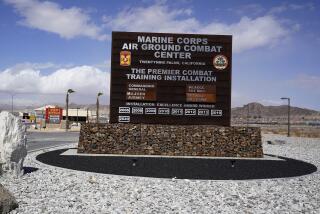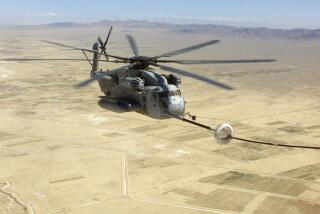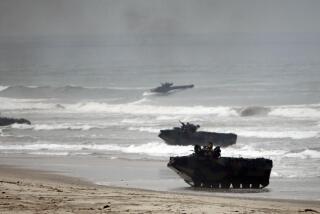‘They Could Be Dying if We Didn’t Do Things Right’
- Share via
WITH THE MARINES IN SOUTHERN AFGHANISTAN — Michael Goodenough and Jerry Lovell, both sons of Southern California, were on alert in the chilly night air of this high desert wasteland in Central Asia when the word was passed with an urgent hush: Intruders were probing to see whether the Marine compound could be attacked.
The reaction of Cpls. Goodenough and Lovell, and other Marines from Camp Pendleton, was swift and unequivocal.
From dug-in positions around the wide perimeter outside the compound dubbed Camp Rhino, the Marines launched dozens of mortar rounds at locations where intruders had been spotted during a long, tense night Thursday.
“We’re the tip of the spear,” said Goodenough, 23, of Whittier. “This is what we’ve practiced for.”
“It was a moment I was glad to be in the Marine Corps,” said Lovell, 22, of Lancaster.
It was a busy night for Marines based at this heavily fortified compound, which the troops seized Nov. 26 to use as a staging area for the campaign to topple the Taliban government and capture leaders of the Al Qaeda terrorist network.
Marines patrolling roads near Kandahar killed seven suspected Taliban and Al Qaeda soldiers and destroyed three vehicles after the drivers headed toward the U.S. troops at high speed. It was the Marines’ first offensive ground action of the war.
The “perimeter probing” incident also was a first. No one had been bold enough to approach the compound.
Whether there will be further attempts is the big unknown at this ad hoc base, which serves a force of more than 1,300 personnel and has an airstrip being used by combat helicopters and fixed-wing aircraft.
The mortars were fired after Marines spotted several people moving toward Camp Rhino, some in vehicles, some on foot.
The intruders fired flares to get a better look at Marine defenses. It proved to be a bad tactical move. The Marines immediately responded with long-distance, crater-causing mortar rounds.
When a Huey helicopter crashed and burst into flames at Camp Rhino while the mortars were being fired, Marines worried that the intruders had destroyed the craft. Later, it was determined that the crash, which left two Marines slightly injured, was caused by the choking dust that envelops the area.
Although Afghan opposition forces appear to be routing the Taliban and Al Qaeda, there is concern that the latter might make one final attempt to inflict casualties on American military personnel to salvage a symbolic victory. For the second night in a row, the compound was on high alert Friday, with increased patrols.
Goodenough, Lovell and other Marines manning the mortar batteries said the Thursday night incident had been much like their training scenarios at Twentynine Palms and Camp Pendleton yet quite different at the same time.
“In practice, you don’t have that much emotion,” explained Staff Sgt. Eddie Lozano, 25, of Del Rio, Texas. “But this time, you knew in your heart that Marines were out there”--in dug-in defensive positions--”and they could be dying if we didn’t do things right.”
The Marines did things right. The intruders apparently fled, and long-range patrols launched later could find no evidence that they had advanced beyond the point where they were detected more than a mile from the base.
For some of the Marines, there was a sense of relief that the long wait for action was finally over. The troops are part of the 15th Marine Expeditionary Unit, which was heading toward a routine six-month deployment in the Persian Gulf when the Sept. 11 terrorist attacks occurred.
“We were all very anxious” to engage the enemy, said Cpl. David Mueller, 21, of Pleasant Prairie, Wis.
“It’s a feeling of adrenaline that takes over your body,” said Staff Sgt. Alejandro Quiroz, 27, of National City. “You just react like you’ve been trained.”
As they stand guard in makeshift huts and dug-in locations throughout the sandy, rock-strewn terrain, the mortar-battery Marines have decorated their outdoor sleeping conditions with signs that express their post-Sept. 11 views.
At one location that has taken the name Camp Justice for America hangs a hand-scrawled sign on a hunk of cardboard: “We the people of the United States are going to kick your ass.”
In other dug-ins, Marines have tried for a Christmas theme with tiny stockings hung near mortar canisters.
More to Read
Sign up for Essential California
The most important California stories and recommendations in your inbox every morning.
You may occasionally receive promotional content from the Los Angeles Times.










